 Have you ever seen headlines like these?
Have you ever seen headlines like these?

No consensus on human causes of climate change, say scientists
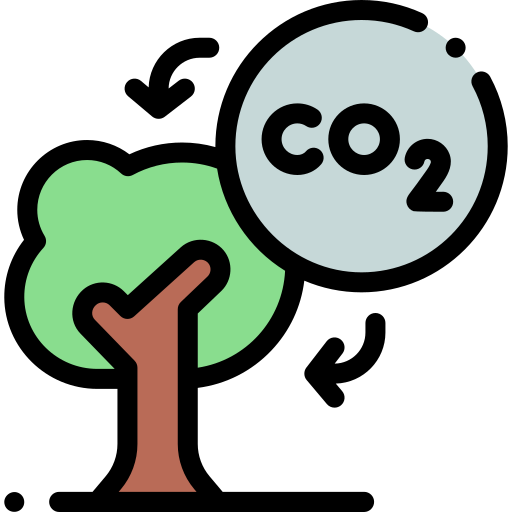
High CO2 levels to increase plant growth
These headlines are examples of misinformation.
Misinformation is incorrect or misleading information. It's different from disinformation — information that's false on purpose — because it isn't always meant to deceive people, but it can have the same effect as disinformation:
It can lead to skepticism, contrarianism, and outright denial of climate change.
It increases polarization around climate action, making it extra difficult for people who don’t see themselves as climate activists to get engaged.

What Is Climate Change Misinformation?
Misinformation about climate change is any information that makes people doubt scientific facts about climate change.
In the context of climate change research, misinformation may be seen in the types of behavior and information which cast doubt on well-supported theories, or in those which attempt to discredit climate science.
Misinformation can have the same effect on your thinking as disinformation if facts are presented out of context or important details are left out.
How do these headlines misinform people?
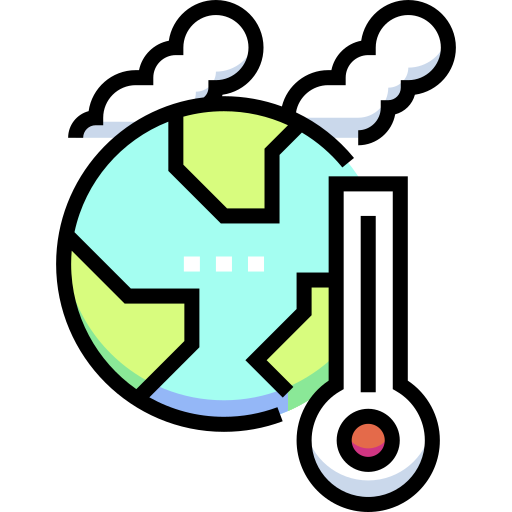
No consensus on human causes of climate change, say scientists
A majority of scientists — 97% of all scientists who have published reports on climate change — agree that climate change is caused by human activity.
The headline gives the small minority who disagree an equal voice to the vast majority of scientists who agree that climate change is anthropogenic.
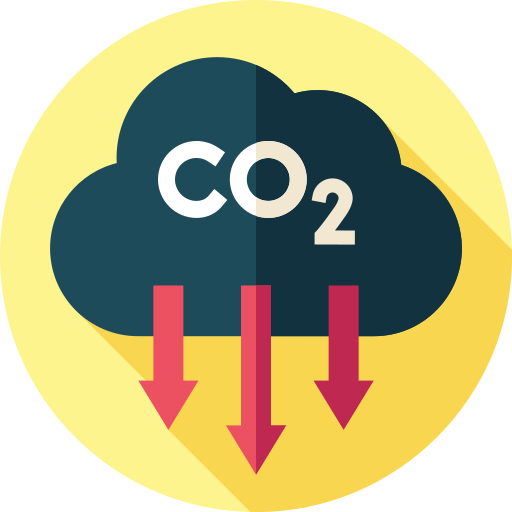
High CO2 levels to increase plant growth
It's true that carbon dioxide can help plants grow, but high levels of CO2 in the Earth's atmosphere have other disastrous effects on climate.
The headline makes high CO2 levels look like a good thing for the environment, when there's lots of counter-evidence to suggest otherwise.
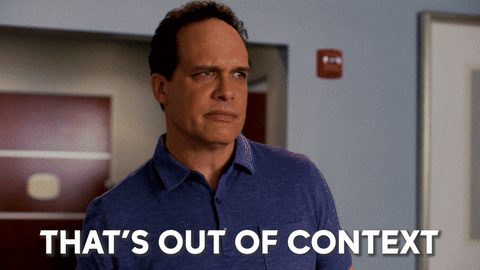
Why Does It Matter?
Misinformation about climate change has confused the public, led to political inaction, and stalled support for or led to rejection of mitigation policies.
If people are misinformed about climate change, they'll be more likely to doubt the reality and urgency of climate change, or the credentials of climate scientists themselves. They'll also be more skeptical of climate change solutions.
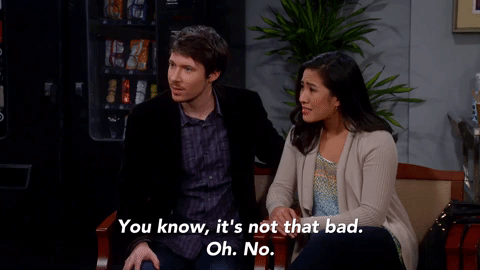
This can lead to denial that takes on different forms:
trend denial — "The Earth isn't really getting that much warmer."
attribution denial — "Humans didn't cause climate change. It's a natural process."
impact denial — "Climate change won't have much of an effect where we live."
consensus denial — "Scientists don't agree on the causes of climate change."
What Are The Effects Of Climate Misinformation?
It undermines strong messaging about climate change.
When the media gives equal weight to "dissenting" voices, it affects public perception of the scientific consensus around climate change.
When people are regularly exposed to false information, they become more distrustful of climate change facts and climate scientists.
Scientists and media sources are reluctant to be seen as climate activists and prefer to keep themselves neutral, so they hesitate to use strong language to identify how serious the climate crisis is.
 It creates doubt about solutions.
It creates doubt about solutions.
Those who deny or minimize the impacts of climate change use the neutrality of scientists and the media to say things aren’t as bad as they seem.
Outright denialism is fading away as more and more people accept the reality of climate change, but a new trend is emerging: solution misinformation that targets climate policies and renewable energy.
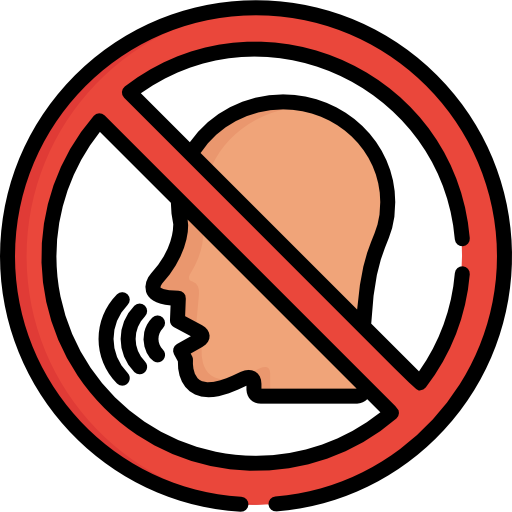
It has a silencing effect.
Increasing polarization in climate change conversations can cancel out the positive impacts of sharing accurate climate information.
It’s extra difficult for people who don’t see themselves as climate activists to get involved. People are hesitant to talk to friends and family about climate because they feel they're in the minority.
They feel they don’t know enough and they'll have to defend disagreements about the science, which they don’t feel equipped to do.
How Does It Spread?
3 ways that climate misinformation spreads:

Homophily — our tendency to form our social bonds around people who think like us, both offline and online. We create an echo chamber around ourselves.
 Algorithmic bias — social networks promote content to us based on what content we regularly engage with. It increases our confirmation bias of our own beliefs.
Algorithmic bias — social networks promote content to us based on what content we regularly engage with. It increases our confirmation bias of our own beliefs.
 Fake news — bots and malicious accounts that intentionally spread false information, or public relations campaigns driven by powerful interest groups.
Fake news — bots and malicious accounts that intentionally spread false information, or public relations campaigns driven by powerful interest groups.
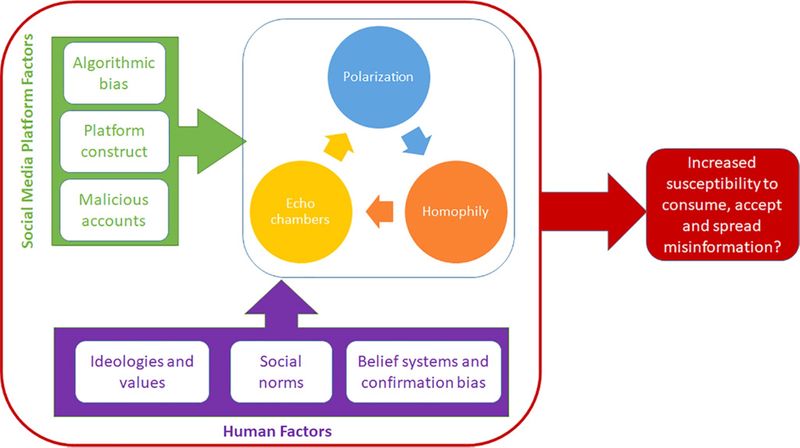
Scenario: Mike And The "Climate Realists"
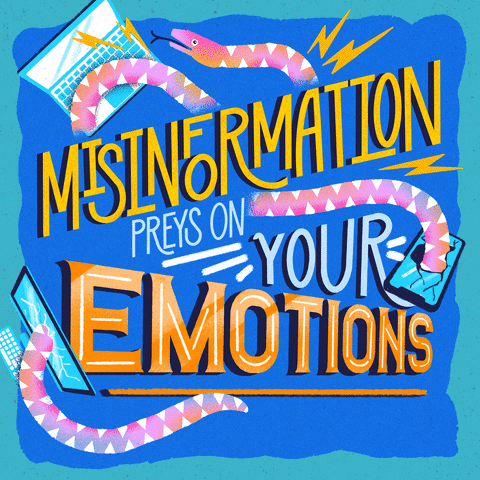
Let's look at an example of how the spread of misinformation plays out.
 Your friend Mike recently got his first job as an industrial engineer. His new colleagues at the lunch table start talking passionately about climate change.
Your friend Mike recently got his first job as an industrial engineer. His new colleagues at the lunch table start talking passionately about climate change.
Mike tells them he doesn't know much about climate change, since it's not his area. His colleagues invite him to their Facebook group called "Climate Realists", where they post articles from climate skeptic websites that question anthropogenic climate change.
Mike clicks on some of the articles posted in the group's feed. They're written by scientists and backed up with statistics, but they contain very strong language about environmental groups and the media.
He starts to agree with these arguments as he reads them, and he suddenly gets more and more articles in his news feed written by climate change skeptics.
Mike reposts at least one of these articles to his Facebook page every day and makes comments about how "the media is spreading hysteria about climate change".
Quiz
Mike shares an article with you titled "26 Reasons Climate Scientists Are Wrong About Climate Change". You're sure a lot of the arguments are misinformation. What should you do? Select all that apply.
Take Action

The next time you see an article on climate change on your social media timeline:
Click the links below for more Climate Communications Bytes!
Byte 1: How does misinformation derail climate change conversations?
Byte 2: 7 things people get wrong about climate change
Byte 3: 6 myths we need to confront if we want a clean energy future
Byte 4: Why we need a new approach to climate change conversations
Byte 5: Why aren't people more worried about climate change?
Byte 6: Can I talk to people about climate change even if I'm not an expert?
Byte 7: 5 things to consider before you start a conversation about climate change
Byte 8: 6 ways to have better conversations about climate change
Byte 9: What is the climate change “spectrum of engagement”?
Byte 10: How will the "messaging triangle" help me talk to people about climate change?

These Bytes were created with the assistance of Generation Climate.

Your feedback matters to us.
This Byte helped me better understand the topic.

